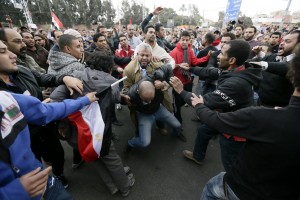C

In this Wednesday, Dec. 5, 2012 file photo. supporters of then- Egyptian President Mohammed Morsis beat an opponent, center, during clashes outside the presidential palace, in Cairo, Egypt. Egyptian authorities switched the venue for the trial of the former Islamist president on Sunday, Nov. 3, 2013 a last-minute change made after the Muslim Brotherhood called for mass demonstrations at the original location. The trial of Morsi, now to be held east of the capital on Monday, could lead to another round of bloodshed as his supporters look likely to face an emboldened security apparatus that has boosted its forces for the hearing. AP
AIRO — Egypt’s deposed Islamist president was brought from the secret location of his four-month detention to face trial Monday on charges of incitement of violence and murder. It was Mohammed Morsi’s first public appearance since his ouster in a coup on July 3.
If convicted, Morsi — Egypt’s first freely elected president — could face the death penalty.
Since his ouster, Morsi has been held at a secret military location. He was flown Monday to the venue of his trial — a police academy in an eastern Cairo district — by helicopter, according to Egypt’s official MENA news agency. His co-defendants, 14 senior members of his Muslim Brotherhood, were taken to the venue from their jail in a suburb south of the city in armored police cars.
The proceedings were expected to start later Monday morning.
The trial is fraught with risks and comes amid a highly charged atmosphere in a bitterly polarized nation, with a deepening schism between Morsi’s Islamist supporters in one hand and Egypt’s security establishment and the nation’s moderate Muslims, secularists, Christians and women on the other.
In a last-minute change, authorities on Sunday switched the trial’s venue in a move apparently aimed at thwarting mass rallies planned by the Muslim Brotherhood, the group from which Morsi hails.
Security was tight around the trial’s venue, with hundreds of black-clad riot police backed by armored vehicles deployed around the sprawling complex. Several military armored vehicles were also deployed. Police helicopters hovered over the site. The final stretch of road leading to the academy was sealed off, with only authorized personnel and accredited journalists allowed to approach the facility.
The academy is also being used for the re-trial of Morsi’s predecessor, Hosni Mubarak, whose 29-year regime was toppled in a 2011 popular uprising. Mubarak is charged with failing to stop the killing of some 900 protesters during the 18-day uprising.
Several hundred Morsi supporters gathered outside the police academy, carrying posters of the ousted president and banners depicting an open palm with four fingers — the symbol commemorating a pro-Morsi sit-in that was violently cleared by security forces in August. They also chanted slogans against Gen. Abdel-Fattah el-Sissi, the military chief who led the July coup.